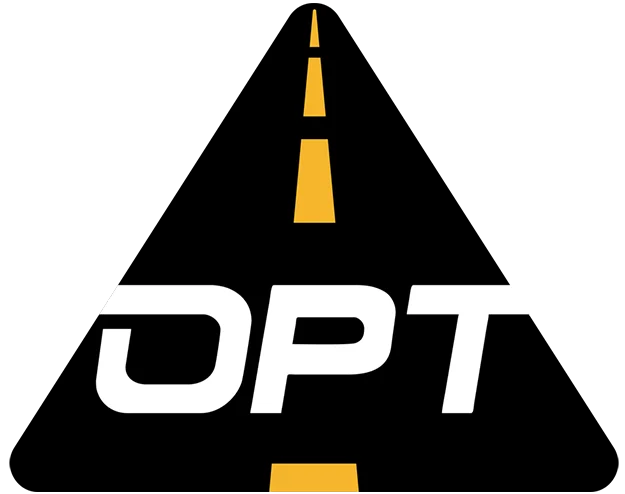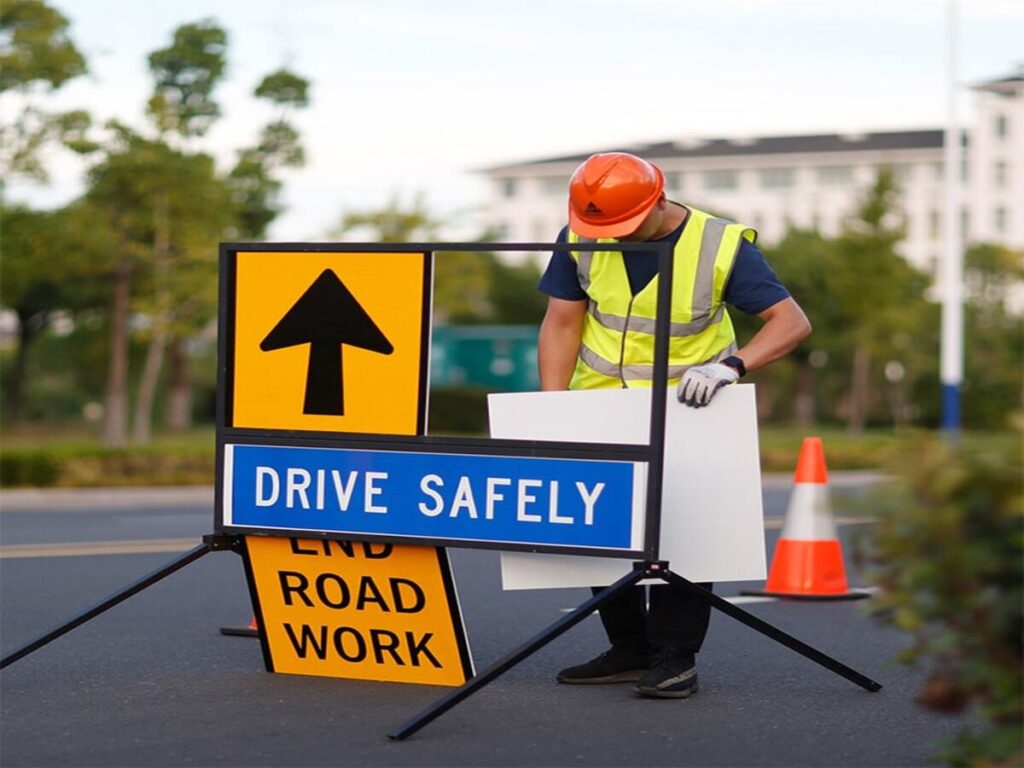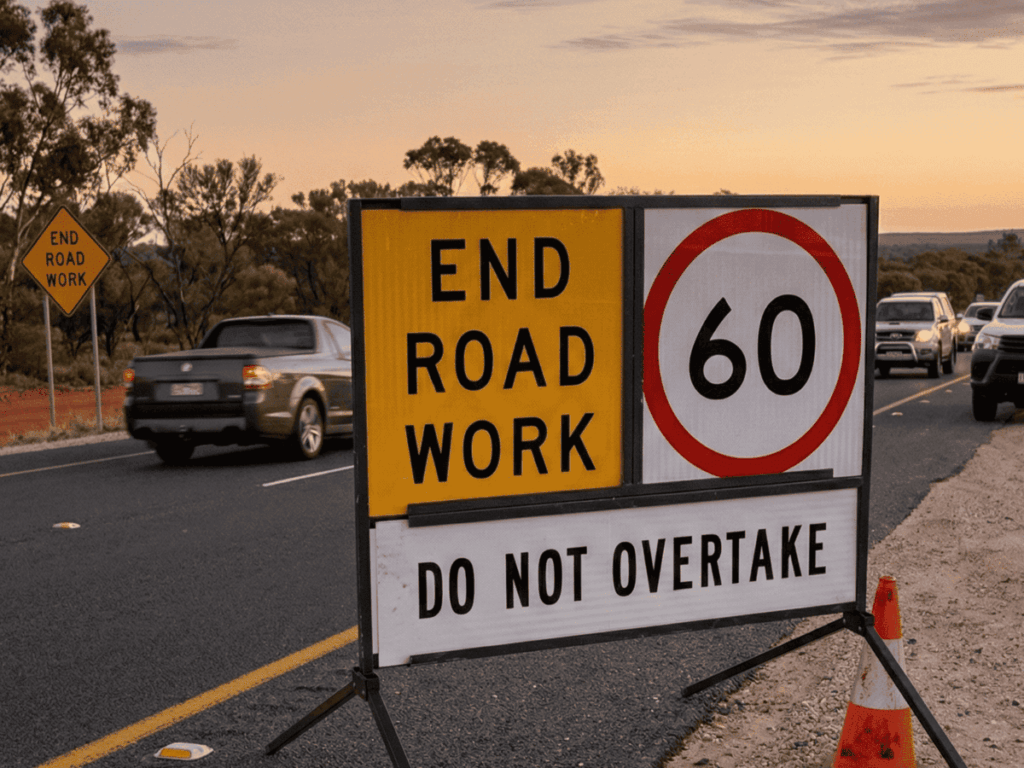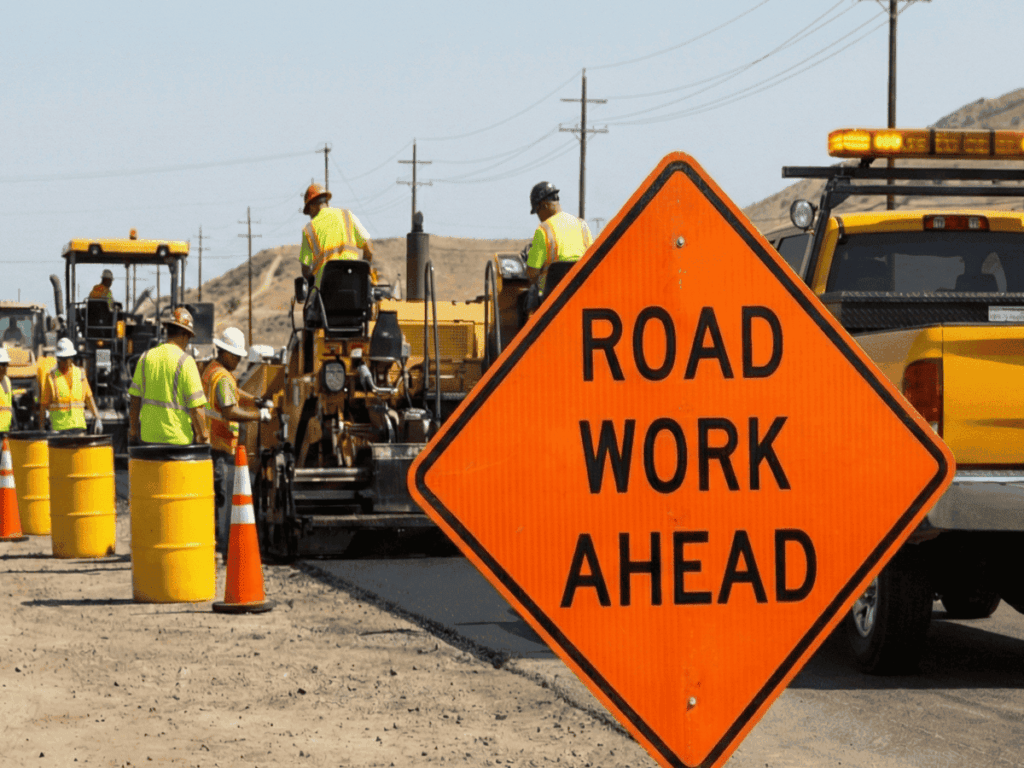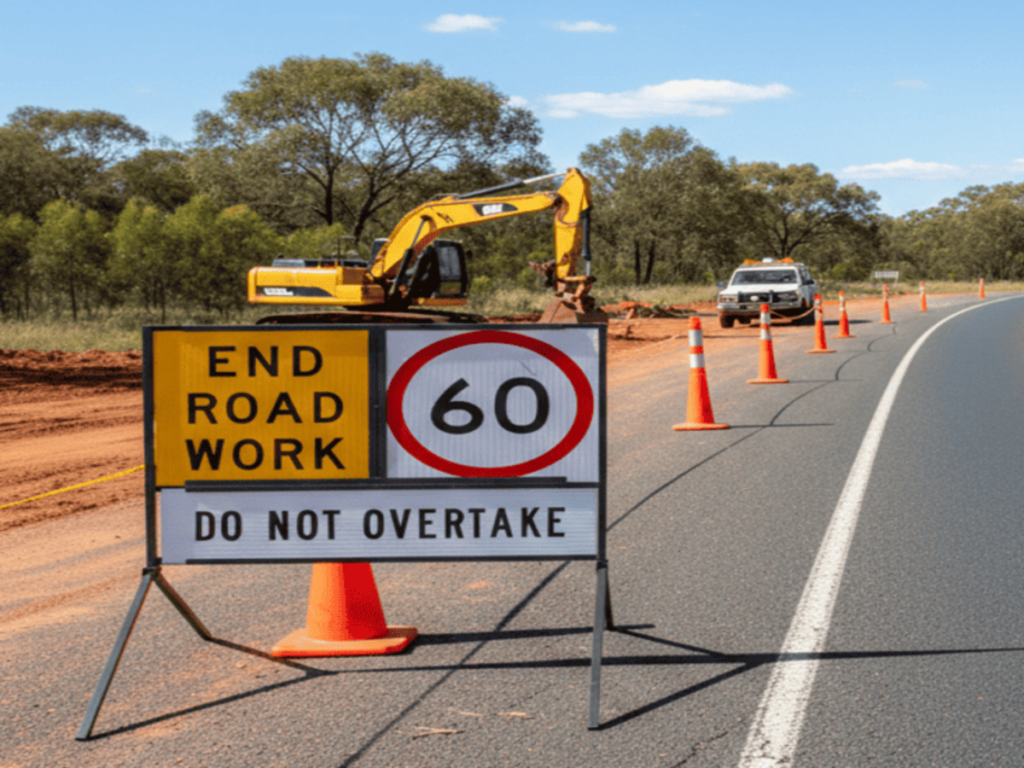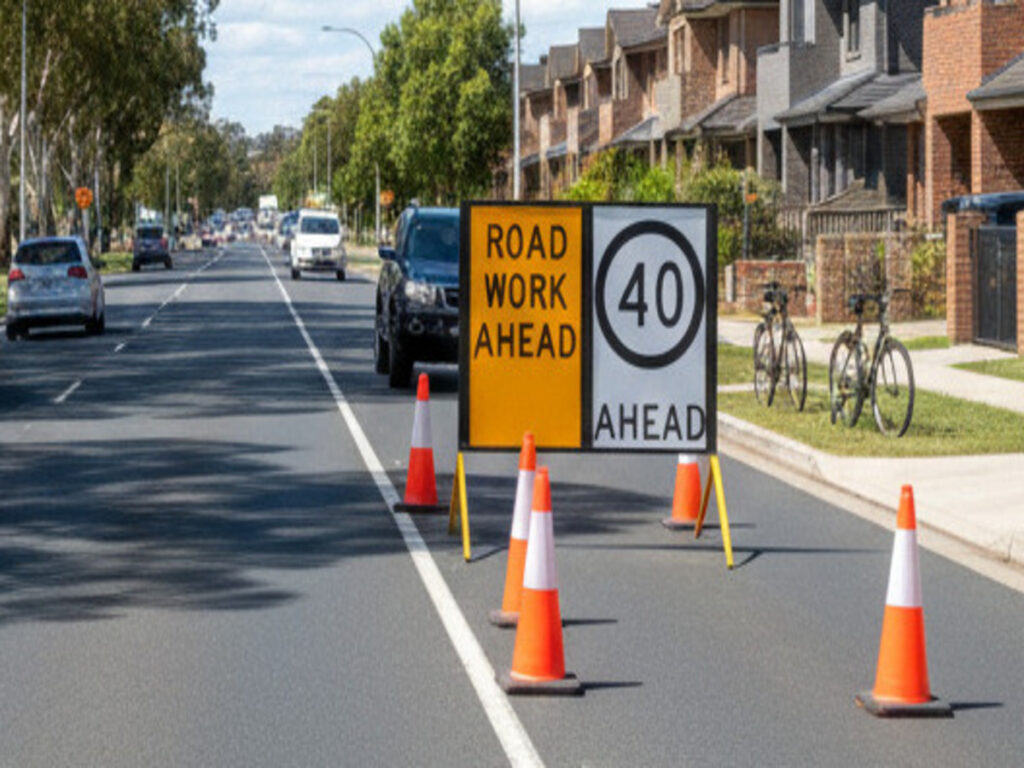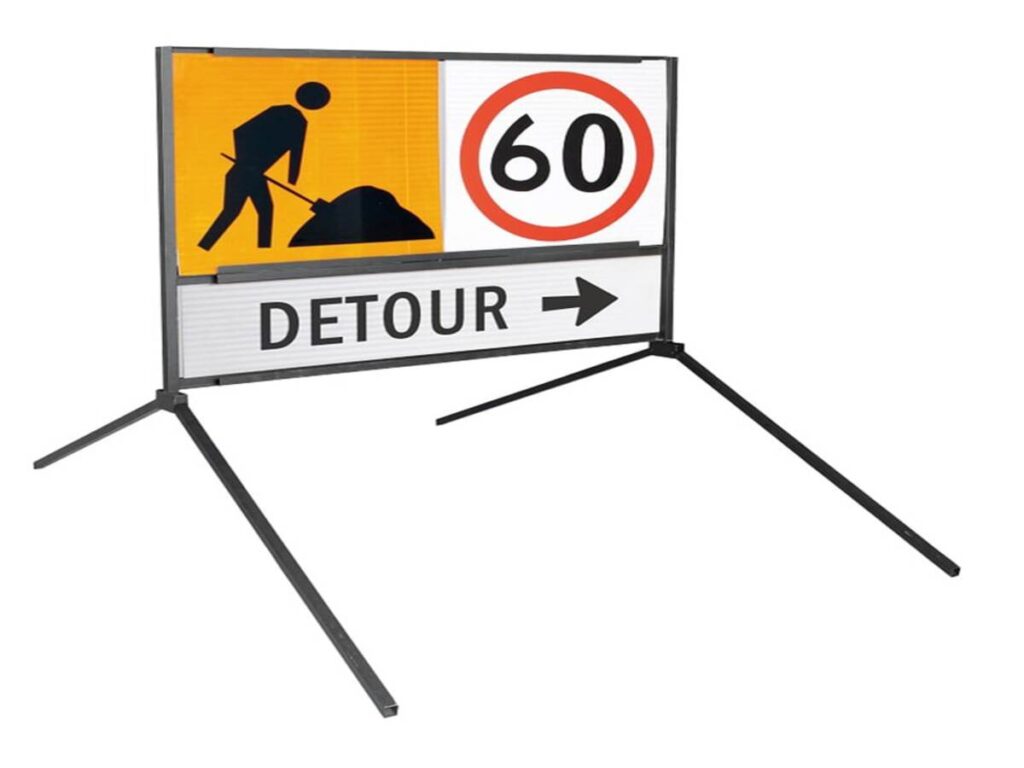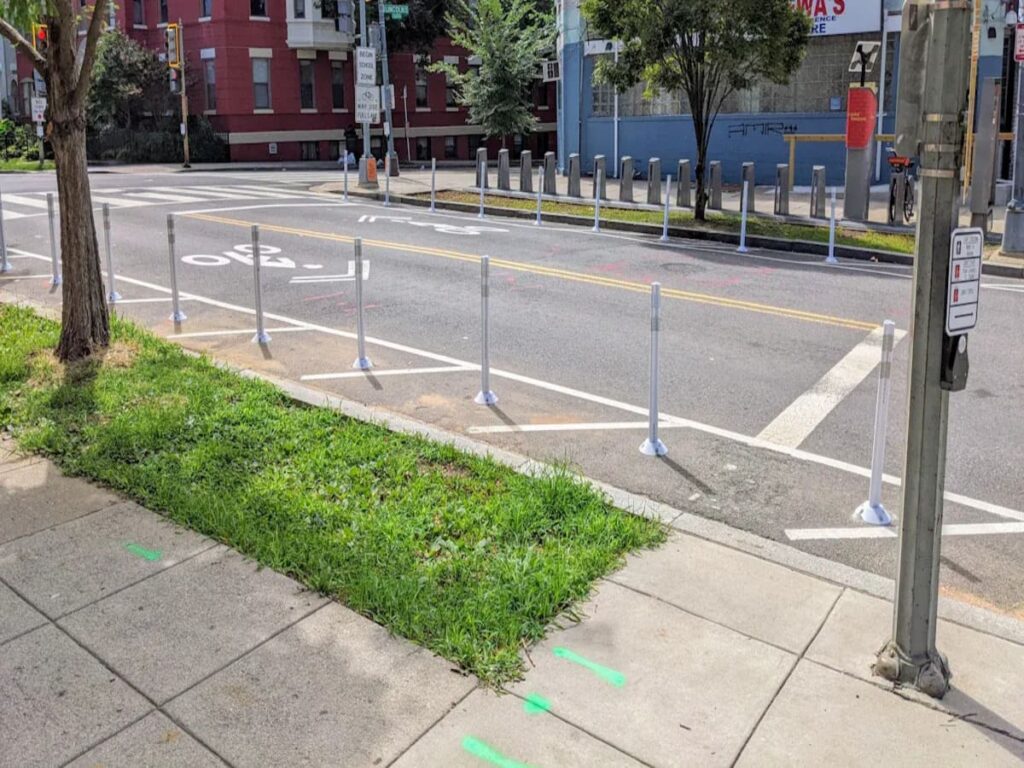
뉴욕 도트 연석 확장 및 도로 안전 표지판을 사용하여 도시를 더 좋게 만드는 데 도움이 됩니다.. 이는 사람들의 안전을 지키고 교통 흐름을 개선하는 데 도움이 됩니다.. 교통 진정 장치는 명확한 결과를 보여줍니다.. 예를 들어, 넥다운을 하면 길을 건너는 것이 더 빨라집니다. 선행 보행자 간격은 충돌 사고의 절반 이상을 멈추는 데 도움이 됩니다..
| 측정/이니셔티브 | 안전에 미치는 영향 |
|---|---|
| 넥다운/전구 출력 | 교차 거리가 짧아집니다. |
| 주요 보행자 간격 (LPI) | 보행자-차량 충돌을 다음과 같이 줄입니다. 50% |
~에 광교통, 우리는 이러한 교통 안전 혁신의 중요성을 인식하고 있습니다.. 우리는 다양한 제품을 제공합니다, 포함 교통 진정 장치 그리고 가시성이 높은 도로 표지판, 모두 보행자 안전을 최우선으로 하면서 교통 흐름을 향상시키도록 설계되었습니다.. 우리의 솔루션은 현대 도시 교통의 진화하는 요구를 충족하도록 구축되었습니다., 더 나은 이동성과 모든 도로 사용자의 보호를 위해 도시가 인프라를 최적화하도록 지원. 교통 흐름을 개선하는지 여부, 횡단보도 가시성 향상, 또는 안전 규정 준수 보장, 광교통 더 안전한 지원을 제공하는 도구가 있습니다., 더 똑똑한 도시.
주요 테이크 아웃
- 연석 확장은 넥다운(neckdown) 또는 전구 아웃(bulb-out)이라고도 합니다.. 사람들이 더 안전하게 길을 건너도록 도와줍니다.. 교차 거리를 짧게 만들어서 그렇게 합니다..
- 선두 보행자 간격으로 충돌 사고를 절반으로 줄일 수 있습니다.. 이는 혼잡한 교차로를 걷는 사람들에게 더 안전한 곳으로 만듭니다..
- 연석 확장 근처에 도로 안전 표지판을 설치하는 것이 중요합니다.. 운전자가 속도를 늦추고 건너는 사람을 감시하는 데 도움이 됩니다.. 이렇게 하면 교통 흐름이 더 좋아집니다.
- 교통 진정 조치를 함께 사용하는 것이 효과적입니다.. 연석 확장과 명확한 표지판은 충돌률을 크게 낮출 수 있습니다. 이것은 모든 사람에게 거리를 더 안전하게 만듭니다.
- 연석 확장 및 표지판을 양호한 상태로 유지하는 것이 중요합니다.. 좋은 디자인과 정기적인 점검은 제품의 원활한 작동에 도움이 됩니다., 악천후에도.
연석 확장이란 무엇이며 어떻게 도로 안전을 향상합니까??
연석 확장과 도로 안전에서의 역할 정의
연석 확장은 넥다운(neckdown) 또는 전구 아웃(bulb-out)이라고도 합니다.. 일종의 교통 안정 장치입니다.. 짧은 공간에서 보도를 더 넓게 만듭니다.. 모퉁이나 블록 중앙에서 볼 수 있습니다.. 교통 엔지니어들은 연석 확장을 사용하여 거리를 안전하게 유지합니다.. 아래 표에는 연석 확장이 무엇이며 왜 중요한지 설명되어 있습니다.:
| 정의/설명 | 목적/이점 |
|---|---|
| 연석 확장 (넥다운, 전구가 나가다) 짧은 거리의 보도를 넓히는 교통 진정 조치입니다.. | 교차로를 더 짧게 만들고 사람과 운전자가 서로를 더 잘 볼 수 있도록 돕습니다.. |
| 연석 확장은 종종 다른 교통 진정 조치와 함께 사용됩니다.. | 보행자가 건널 수 있는 거리가 적습니다.. |
| 보행자의 가시성을 높이고 교차로의 일광을 강화합니다.. | 대중교통을 타고 내릴 때 사람들의 안전을 지켜줍니다.. |
| 도로를 시각적으로 좁혀 교통 속도를 늦춥니다.. | 주차된 차량을 이동하는 차량으로부터 보호합니다.. |
| 연석 확장은 좁은 보도에 경사로를 위한 공간을 제공합니다.. | 슈퍼스트리트에서 유턴을 위한 공간 제공. |
연석 확장은 도로를 더욱 안전하게 만드는 데 도움이 됩니다.. 운전자는 걷는 사람들을 더 쉽게 볼 수 있습니다.. 사람들이 길을 건너는 것이 더 쉽다. 연석 확장은 과속방지턱과 같은 다른 안전 도구와 잘 작동합니다..
도로 안전 개선에 있어 연석 확장의 주요 이점
연석 확장은 많은 안전상의 이점을 제공합니다.. 도로가 더 작아 보이게 만들어요. 이는 운전자에게 혼잡한 장소 근처에서 속도를 줄이도록 지시합니다.. 연석 확장으로 주차된 차량에 사람들이 줄을 서게 됩니다.. 이렇게 하면 길을 더 빨리 건너게 됩니다. 보행자는 횡단하는 데 더 많은 시간을 얻습니다.. 교통 관리자는 선행 보행자 간격을 사용할 수 있습니다..
연구에 따르면 연석 확장은 운전자가 사람들을 위해 정지하는 데 도움이 됩니다.. 운전자 양보율이 증가합니다. 12.7%. 운전자들은 약 속도를 늦춘다. 10.1 혼잡한 코너에서 km/h. 아무도 건너지 않아도 이런 일이 일어난다. 느린 속도는 모든 사람에게 거리를 더 안전하게 만듭니다..
연석 확장은 교통을 진정시키기 위한 더 큰 계획의 일부입니다.. 뉴욕과 같은 도시에서는 사람들을 보호하고 교통을 더 효과적으로 통제하기 위해 이를 사용합니다..
연석 확장과 도로 안전 표지판이 함께 작동하여 교통 흐름을 개선하는 방법
연석 확장 근처 도로 표지판의 중요성
연석 확장과 도로 안전 표지판이 함께 작동하여 거리 안전을 강화합니다.. 확장으로 횡단보도 거리 단축, 보행자가 운전자에게 더 잘 보이도록 하기. 이러한 연장선 근처에 배치된 도로 안전 표지판은 운전자에게 속도를 줄이고 횡단보도를 건너는 보행자에 대해 주의를 기울이도록 유도합니다.. 횡단보도 등의 표지판, 생산하다, 정지 신호는 명확한 안내를 제공합니다., 운전자에게 언제 정지하거나 양보해야 하는지 알 수 있도록 보장. 이는 혼잡한 횡단보도에서 특히 중요합니다..
많은 도시에서는 충돌을 줄이고 차량 속도를 늦추기 위해 교통 안정을 사용합니다.. 연석 확장과 표지판 모두 이 목표에 도움이 됩니다.. 확장 근처의 경고 표지판과 보행자 표지판은 운전자에게 주의를 환기시킵니다.. 이 표지판은 자동차와 걷는 사람 사이의 문제를 막는 데 도움이 됩니다.. 운전자가 연석 확장에서 표지판을 볼 때, 그들은 속도를 늦춘다. 운전자들은 횡단보도를 더 자세히 살펴봅니다..
도로 안전 프로젝트의 효과적인 표지판 배치 전략
도로 안전 표지판을 좋은 곳에 두는 것은 안전을 위해 중요합니다. 표지판은 보기 쉽고 연석 확장에 가까워야 합니다.. LED 정지 신호는 어두울 때 잘 작동합니다.. 사전 양보 표시는 횡단보도 전에 운전자에게 경고합니다.. 번쩍이는 비콘 연장선 근처의 횡단보도에서 운전자의 주의를 끌기. 횡단보도의 밝은 조명은 운전자가 밤에 사람들을 볼 수 있도록 도와줍니다..
좋은 계획은 다양한 종류의 표지판을 함께 사용하는 것입니다. 예를 들어:
- 놓다 보행자 교차 표지판 연석 확장마다.
- 혼잡한 횡단보도에서는 깜박이는 신호등을 사용하세요.
- 각 연장 전에 사전 수율 표시 추가.
- LED 설치 정지 신호 보기 힘든 곳.
- 횡단보도에 너무 가까이 주차하지 않도록 하세요., 그래서 표지판을 쉽게 볼 수 있어요.
연석 확장과 도로 안전 표지판은 함께 교통 흐름을 개선하고 횡단보도를 더욱 안전하게 만듭니다.. 이러한 아이디어는 운전자가 사람을 보고 규칙을 준수하는 데 도움이 됩니다.. 도시가 이러한 도구를 사용할 때, 모두가 더 안전하게 길을 건널 수 있어요.
연석 확장이 있는 표지판에 대한 규정 준수 및 설계 지침
도로 표지판 및 연석 확장에 대한 MUTCD 표준 탐색
그만큼 균일 한 교통 통제 장치 매뉴얼 미국의 도로 안전 표지판에 대한 주요 규칙을 제공합니다.. 이러한 규칙은 도시가 연석 확장 근처에서 동일하게 보이고 이해하기 쉬운 표지판을 만드는 데 도움이 됩니다.. MUTCD는 표지판이 보기 쉽고 읽기 쉬워야 한다고 말합니다.. 횡단보도나 연석 확장 전에 운전자가 눈에 띄는 곳에 놓아야 합니다.. 때때로, 지방 정부는 특별한 거리 형태나 필요에 따라 자체 규칙을 추가합니다..
연석 확장 및 표지판에 대한 연방 및 지역 규칙이 다를 수 있습니다.. 아래 표에는 몇 가지 주요 차이점이 나와 있습니다.:
| 측면 | 연방 표준 (아다) | 지역 규정 (일반적인) |
|---|---|---|
| 커브 램프 요구 사항 | 모든 신규 또는 변경된 횡단보도와 대중교통 정류장에 제공되어야 합니다.. | 다를 수 있음; 변경되지 않는 한 ADA 이전 구조에는 반드시 필요하지 않습니다.. |
| 감지 가능한 경고 | 시각 장애가 있는 보행자를 지원하기 위한 연석 램프에 필요한 기능. | 보편적으로 의무화되지 않음; 지역 관할권마다 요구 사항이 다를 수 있습니다.. |
| 규정 준수 시행 | 민권국(Civil Rights Division)에 의해 ADA 제II편에 따라 시행됩니다.. | 지방정부는 자체 집행 메커니즘을 보유할 수 있습니다., 크게 다를 수 있는 것. |
뉴욕과 같은 도시는 두 가지 규칙을 모두 따릅니다.. 이는 모든 연석 확장 및 표지판이 최대한 안전한지 확인하는 데 도움이 됩니다..
교통 관리 시 도로 안전 표지판에 대한 실제 설계 고려 사항
설계자는 연석 확장 근처에 도로 안전 표지판을 배치할 때 여러 요소를 고려해야 합니다.. 표지판은 다가오는 차량을 향하도록 위치해야 하며 운전자와 보행자 모두가 볼 수 있는 높이에 배치되어야 합니다.. 야간이나 악천후 시 가시성을 확보하기 위해 반사 소재가 자주 사용됩니다.. 추가적으로, 표지판은 건너거나 기다리는 보행자의 시야를 방해해서는 안 됩니다..
엔지니어들은 보도의 너비와 휠체어나 유모차를 위한 공간이 있는지도 확인합니다.. 바쁜 장소에서, 추가 표지판이나 깜박이는 조명은 운전자의 주의를 기울이는 데 도움이 될 수 있습니다.. 좋은 디자인은 모든 사람을 안전하게 보호하고 자동차가 문제 없이 움직일 수 있도록 돕습니다..
표지판 배치 및 연석 확장 구현의 과제 극복
도로 안전 표지판 배치 시 일반적인 문제 해결
엔지니어는 도로 안전 표지판을 설치할 때 어려움에 직면합니다.. 이 표지판은 운전자와 보행자 모두에게 명확하게 보여야 합니다.. 하지만, 주차된 자동차나 벤치와 같은 장애물이 방해할 수 있습니다.. 이것을 해결하기 위해, 디자이너들은 종종 표지판의 높이를 높이거나 연석 확장에 더 가깝게 배치합니다.. 붐비는 지역에서, 표지판은 광고 및 기타 신호와 섞일 수 있습니다.. 가시성을 확보하기 위해, 기획자는 단순한 아이콘과 반사 소재를 사용하여 표지판을 더욱 눈에 띄게 만듭니다..
많은 자동차로 인해 교통 진정 장치가 제대로 작동하지 않을 수 있습니다.. 연구에 따르면 연석 확장은 운전자가 사람들을 위해 속도를 늦추고 정지하는 데 도움이 됩니다.. 위에 80% 의 운전자는 연석 확장이 도움이 된다고 생각합니다.. 이는 사람들이 더 쉽게 알아볼 수 있고 규칙 위반이 적다는 것을 의미합니다.. 이러한 변화는 교통 진정 프로젝트를 통해 교차로를 더욱 안전하게 만들고 교통 흐름을 개선하는 데 도움이 됩니다..
겨울철이나 교통량이 많은 기간 동안 도로 안전 표지판으로 안전 확보
겨울은 교통 안정 프로젝트를 더욱 어렵게 만듭니다.. 눈과 얼음은 연석 확장을 덮고 도로 안전 표지판을 가릴 수 있습니다.. 유지보수 팀은 안전 기능이 계속 작동하도록 미리 계획을 세워야 합니다.. 전문가들은 도움이 되는 몇 가지 방법을 제안합니다.:
- 초기에 유지보수 담당자와 설계 계획에 대해 논의하세요..
- 필요한 경우 눈을 놓을 장소와 눈을 옮기는 방법을 추가하세요..
- 충분한 인력이 있는지 확인하고 보도에서 눈과 얼음을 치우기 위한 규칙을 설정하세요..
- 책임자가 누구인지, 안전 기능에서 눈을 얼마나 빨리 치워야 하는지 명확히 하세요..
- 튼튼한 재료를 사용하면 물건이 더 오래 지속되고 수리가 덜 필요합니다..
차가 많을 때, 연석 확장 및 표지판은 쉽게 보고 사용할 수 있어야 합니다.. 높은 교차로와 목 아래로 내려감은 자동차의 속도를 늦추고 사람들의 안전을 유지하는 데 도움이 됩니다.. 팀은 교통 상황을 관찰하고 필요한 경우 표지판을 이동합니다.. 이러한 단계는 교통 흐름을 원활하게 하고 모든 사람을 안전하게 보호하는 데 도움이 됩니다.
| 도전 | 해결책 |
|---|---|
| 눈 덮음 연석 확장 | 눈 저장 및 제거를 조기에 계획하십시오. |
| 차단 된 표지판 | 양각 또는 반사 표지판을 사용하세요. |
| 높은 트래픽 볼륨 | 표지판 배치 모니터링 및 조정 |
메모: 교통을 잘 진정하려면 디자이너의 팀워크가 필요합니다, 노동자, 그리고 도시 계획가들.
실제 애플리케이션: 도로 안전 표지판 및 연석 확장 실행
사례 연구: 보행자 안전을 강화하는 도로 안전 표지판 및 연석 확장
북미 도시에서는 전구 아웃과 도로 안전 표지판으로 거리를 더욱 안전하게 만들었습니다.. 이 프로젝트는 연석 확장 및 표지판이 어떻게 사람들이 안전하게 건너고 충돌 사고를 줄이는 데 도움이 되는지 보여줍니다.. 아래 표는 전구 아웃으로 인해 큰 차이가 발생한 실제 사례를 보여줍니다.:
| 프로젝트 위치 | 설명 | 결과 |
|---|---|---|
| 에스테로 대로, 포트 마이어스 비치 | 억제로 재건축, 더 넓은 보도, 깜박이는 LED 표지판을 포함한 개선된 건널목. | 보행자 및 자전거 충돌 감소 6 매년 4 연간. |
| 보네스 로드 메인 스트리트, 캘거리 | 연석 확장 및 깜박이는 LED 표지판을 통해 보행자 친화적인 거리로 변신. | 횡단 거리 및 가시성 감소를 통해 보행자 편의성 및 안전성 향상. |
| 보파인 스트리트(Beaufain Street)의 록우드 드라이브(Lockwood Drive) | 교통 진정 및 보행자 피난처를 위한 횡단보도 및 중앙분리대 추가. | 주요 도심 간선 도로를 횡단하는 보행자의 안전 향상. |
| 둥근 돌, 콜로라도 | 초등학교 근처에 신속하게 전구를 설치하는 Vision Zero 혁신 프로그램. | 횡단 거리 단축 및 회전 차량 감속. |
| 코울리, 기원전 | 보호된 대기 구역과 좁은 차선을 통해 횡단보도 안전을 강화하는 Bankhead 초등학교 프로젝트. | 통학하는 학생들의 안전 강화. |
| 미국 고속도로 49, 걸프포트, MS | 횡단보도, 중앙분리대 등 보행자 안전 개선을 위한 평가 및 권고사항. | 높은 사망률을 해결하고 보행자 순환을 개선했습니다.. |
전구 아웃은 보행자에게 더 많은 대기 공간을 제공합니다., 가시성 향상, 교차로 도로를 좁혀 안전성을 높였습니다.. 도시에서는 깜박이는 LED 표지판을 추가하고 횡단보도 규칙을 시행하여 운전자에게 경고하고 규정 준수를 보장하는 경우가 많습니다.. 연구에 따르면 전구가 꺼져 있고 잘 배치된 표지판이 차량 회전을 늦추고 안전성을 높이는 것으로 나타났습니다.. 지자체는 시행 전후의 교통 패턴과 충돌 데이터를 분석해 도시계획을 지도한다..
연석 확장 및 도로 안전 표지판은 도시 프로젝트에 많은 도움이 됩니다.. 사람들은 더 잘 볼 수 있고 길을 더 빨리 건널 수 있습니다.. 코너에서는 자동차가 느리게 회전합니다.. 이러한 것들이 모든 사람의 걷기를 더 안전하게 만듭니다.. 또한 교통이 더욱 원활하게 이동하도록 돕습니다.. NYC DOT는 좋은 디자인과 배수가 중요하다고 말합니다.. 연석 공간 관리도 중요합니다.
FAQ
연석 확장이란 무엇입니까??
연석 확장은 넥다운(neckdown) 또는 전구 아웃(bulb-out)이라고도 합니다.. 모퉁이나 블록 중앙에서 보도를 더 넓게 만듭니다.. 이것은 사람들이 길을 더 빨리 건너는 데 도움이 됩니다.. 운전자와 걷는 사람이 서로를 더 잘 볼 수 있습니다..
도로 안전 표지판은 연석 확장 효율성을 어떻게 향상합니까??
도로 안전 표지판은 운전자에게 연석 확장 근처에서 속도를 줄이도록 지시합니다.. 이 표지판은 운전자에게 건너가는 사람을 조심하도록 상기시킵니다.. 운전자가 규칙을 준수하고 횡단보도에서 사고를 막을 수 있도록 도와줍니다..
도시에서는 연석 확장 근처에 도로 안전 표지판을 어디에 배치해야 합니까??
도시에서는 연석 확장 근처에 표지판을 설치해야 하지만 전망을 차단해서는 안 됩니다.. 표지판은 자신을 향해 다가오는 차량을 향해야 합니다.. 반짝이는 소재는 밤이나 비가 올 때 운전자가 표지판을 볼 수 있도록 도와줍니다..
팁: 운전자가 정지할 시간을 가질 수 있도록 횡단보도 앞에 표지판을 설치하세요..
모든 기상 조건에서 확장 및 표지판 작동을 억제할 수 있습니다.?
예, 그러나 근로자는 연석 확장 및 표지판에 있는 눈과 쓰레기를 치워야 합니다.. 강한, 빛나는 표지판은 겨울이나 폭우에도 사람들이 볼 수 있도록 도와줍니다..
